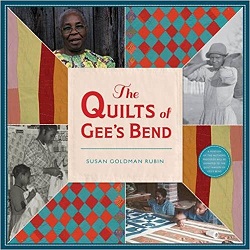
Abrams Books for Young Readers, 2017. 56 pages.
Review written in 2017.
The Quilts of Gee’s Bend tells about an African American community where for generations families taught their girls to quilt.
The book is filled with photos of quilts made by these women. There are common patterns, common themes, but every quilt is unique.
The book also tells of the history of the community and the way the quilts – when discovered as art – helped pull them through some hard times.
Here’s how the book begins, jumping right into the story of one of the quilters:
When Nettie Young was eleven years old, her mother gave her a pile of cloth strips and told her to make a quilt all by herself. Nettie had always sat with her mother and watched her quilting, picking up the scraps at her feet, but this time her mother walked away. She was testing her daughter to see if she was independent as well as talented. The cotton and corduroy scraps were in different colors and patterns: plaids, checks, dots, even a little yellow animal print. The odds and ends came from old work shirts, dress tails, and aprons. Looking back, at age eighty-nine, Nettie said, “When I was growing up, you threw nothing away. . . . You found every good spot for a quilt piece, and that’s how you made your quilts.”
Nettie arranged the strips to form squares in a brilliant geometric design. She called her finished quilt “Stacked Bricks.” From then on, she became known as one of the best quilters in Gee’s Bend, Alabama. “I always loved sewing,” she said. “Didn’t need a pattern . . . I just draw it out the way I want it.”
There’s a photo of that very quilt, which was created in 1928.
We get stories of many of the quilters, along with an abundance of color photos of the quilts. The women didn’t think of their quilts as art. Making them was a way to keep warm and work together.
Pieces of cloth that had been tucked away safely were brought out at night, when, at last, it was time for quilting. “We had no radio, no TV, no nothing,” recalled Mary Lee Randolph. “That’s the way we learned – sitting watching our mamas piecing the quilt. When the sun came down, you be in the house together, laughing and talking. We were more blessed then.
This book celebrates beautiful art created by a community of women in a practice passed down from mothers to daughters.
